- Home
- Madeleine L'engle
The Young Unicorns Page 14
The Young Unicorns Read online
Page 14
“True. But the Micro-Ray’s a powerful tool, isn’t it?”
“Yes. And you’re quite right. This makes it even more liable to misuse. But primitive man couldn’t refuse to use fire, could he, because its misuse would burn down forests and homes?”
The Canon sighed. “We do love to oversimplify, don’t we? Of course you’re right. How about using the Micro-Ray for mental illness?”
“Certainly, where the illness is caused by tumor, or brain damage from a difficult birth, or accident, it may prove very useful.”
“How about psychiatric use?”
“I don’t advocate it.” Sharpness came into the Doctor’s voice.
“Is it being used at all in that way?”
“Not that I know of.”
“How about using it either to stimulate or to sedate certain centers of the brain?”
“I would feel against it as strongly as I did against frontal lobotomies.”
The children did not understand the conversation, but they felt the tension between the two men.
Dr. Austin asked, “You’ve worked with Dr. Calvin O’Keefe, haven’t you, in his experiments with starfish?”
Canon Tallis rejected this idea much as Mrs. Austin had rejected Vicky’s announcement that her mother had been in the theatre. “Not in the actual laboratory work. I’d be a bull in a china shop helping in the lab. Theology is of very little use in grafting nerve rings onto the central disc of a starfish.”
“Wouldn’t you say that O’Keefe’s experiments with regeneration in the starfish were at least as dangerous and open to misuse as mine with the Micro-Ray?”
The Canon’s face was cold. “Possibly.” He looked at his watch. “Mrs. Austin, I must ask you to excuse me. I would much rather stay and continue talking than go on up to Columbia and lecture an ecumenical gathering. But Cardinal Forrester has the flu and I promised I’d pinch hit. Dr. Austin, if it wouldn’t bore you, perhaps you’d come with me, and we could have a cup of coffee afterwards and continue our conversation.”
There was a challenge in Tallis’s voice, and the Doctor accepted it. “Yes. I’ll come.”
After the men had left, Mrs. Austin asked Vicky to walk Mr. Rochester. She or the Doctor usually took the dog on his evening walk, but an unformed anxiety made her loath to leave the children alone in the house without the protection of dog or parent. She knew that she didn’t have to worry about Vicky as long as Mr. Rochester was with her.
Dr. Austin and Canon Tallis walked up Broadway towards the University. “Don’t stop walking and don’t turn around,” the priest said, “but there are two boys in leather jackets following us.”
“Following us in particular?”
“I rather think so.”
There was only the slightest hesitation in Dr. Austin’s step. “Why?”
“I noticed them when we left the house. They were standing in the shadows; they let us get about halfway up the block and then they followed.”
“Why?” Dr. Austin asked again.
“I was hoping that you could tell me,” the priest said.
They crossed 110th Street and continued uptown. Dr. Austin sighed. “I suppose they’re Alphabats. It’s a rather bad gang which Dave, the boy who reads for Emily, used to belong to. I hoped I was wrong but maybe I’m not. For the past week, about, there’ve been one or two walking behind me or just across the street when I’ve gone to take the subway to the hospital in the morning. In the afternoon when I’ve come home I’ve seen them near my subway stop.”
“Do you know why they would be following you?”
“I wish I did.” Dr. Austin looked about him at the busy street which had become familiar through daily association but which was, like Dave, still an unknown quantity to him. They moved through the conglomerate crowd of passers-by, students, old people shuffling along with canes, dog walkers, mothers with babies, light, dark, Oriental. “I’m a simple man, Canon Tallis. I’m not used to living in a melting pot. I have no idea why they’re following me. This winter has in almost every way been more than I’d bargained for.” He and the priest had gone beyond the shops now, many of them still open in the evening, florists, fruit stands, drugstores, paper stores, psychedelic cafés, and reached the conservative buildings of the University campus.
Canon Tallis led the way into the big open quadrangle and up the granite steps of the massive edifice that still bore the name of King’s College. “How well do you know Josiah Davidson?”
“We see a good deal of him because of Emily. But I’m not sure anybody knows Dave very well.”
“What do you think of him?”
Dr. Austin was slow in answering. He had to admit to himself finally that he was being followed as he went to and from work. He knew, too, that the English priest was trying to pump him, but there seemed no reason not to answer this question. “There’s tremendous potential in Dave. But he’s a confused kid, and still full of resentment.”
“Does he ever talk about this gang he belonged to?”
“No. He quite naturally dislikes being reminded of that part of his past.”
“You’re sure that it is past?”
“I’m convinced of it.”
An elderly, professorial type bore down on them, swept them in through the doors. “Canon Tallis? … So good of you to come. We’re anticipating your talk with the deepest interest …” They were taken upstairs in an elevator and led to a lecture hall.
Walking with Rochester in the park, Vicky was feeling moody, not like her favorite, Emily Brontë, this time, or seeing herself as a character in a story, objective, happy, aware, playing her proper role. Instead she was turned in, confused, brooding anxiously about her parents, the genie, the English priest. She was unable to find a part for herself to play in the events of the past days. Whatever was happening, she seemed to be on the outside of the drama, while everybody she loved was being drawn in.
—And yet, she thought,—it’s as though I were on the edge of the whirpool, too.
—Slowly, inexorably, she thought, savoring the words, her imagination as usual helping to lift her gloom,—the young girl was being surrounded by dark forces beyond her comprehension …
But this was too close to fact to give her a pleasurable thrill. She shivered.
Rochester growled and pressed closer to her side.
She looked up. She had walked, in her reverie, into the midst of a group of leather-jacketed boys. She did not like the way the boys were staring at her, deliberately, insolently, from head to toe. One said something in Spanish, gave a mocking laugh. Another answered in coarse English, “Naw, leave her alone.”
“Rochester, let’s go!” she said sharply. She turned; the dog growled, and the boys parted to let her by. One of them turned his transistor radio on, full blast, right in her ear as she passed, and laughed noisily when she jumped.
She hurried home, more angry than frightened at her own stupidity in blundering into them. She had told Emily and Dave about her encounter with Canon Tallis but she would not, she knew, tell them about this. She wasn’t going to have Dave make her feel like a hick again. Anyhow, what was there to tell? She hadn’t been paying attention to where she was going and she had walked into a group of boys. What was so sinister about that?
—But they were sinister, she thought, trying to concentrate on her studies.—It’s not just my imagination. They were like the boys I met with Canon Tallis. He didn’t want them to see him, and he told me to go home.
Her mother, hearing her sigh, asked, “Anything wrong, Vic?”
“Just life,” Vicky said, “and a stinky old Latin translation I should have done last night.”
She began to work diligently.
Dr. Austin enjoyed Canon Tallis’s lecture. It was a concise and brilliant analysis of mob psychology throughout the ages in different countries and cultures. Babel and Babylon, Sodom and Gomorrah, Tiberius and Hitler; illustrations and examples were clear and pointed. The audience was silent, attentive, appreciative
with applause. There was a reception afterwards. The Doctor drank punch that tasted like melted Jell-O and looked around him at the groups of people all wanting to talk to the priest. There were a good many other clergymen of various denominations, and a number of rabbis. He recognized Rabbi Levy from the synagogue down the street. There was a smattering of students, and most of the audience was masculine. They were not eager to let the Canon go, and Dr. Austin got into a long discussion with a psychology professor who was also a Baptist minister, while Canon Tallis had a conversation with Rabbi Levy, who was shaking his beard and waving his hands with enthusiasm.
It was after eleven when the gathering broke up, and Canon Tallis and Dr. Austin sat side by side at a counter drinking black coffee that helped take away the sickly sweet taste of the punch.
Picking up where they had left off, the Canon asked, “Why do you think Dave is through with the Alphabats?”
“Because of Emily.” The doctor took a handful of paper napkins from the container and mopped up the coffee the counter girl had sloshed in his saucer.
“Why?”
“Because he loves her.”
The Canon accepted this. “Tell me about Emily.”
“Emily’s quite a girl. We’re all very fond of her. My kids can learn a lot from her.”
“Such as?”
“Her acceptance of discipline, for one thing.”
Two bearded students who had been at the lecture pushed through the door, their arms full of books, and spoke to the Canon, and were followed by two nuns, who entered into the conversation. When they had all gone on to find empty seats farther down the counter, Tallis said, “The discipline of music. And now the added discipline of blindness. That’s quite a load for a child.”
“Yes. But all Emily thinks of is how best to carry it, not how heavy it is.”
“And you think Dave has learned something from this?”
“I hope we all have.”
“What, in particular?”
Dr. Austin looked around at the assortment of people in the food shop, at the white-capped cook turning hamburgers, at the tired waitress mopping the counter. “In spite of it all Emily has remained completely herself, and untamed and free. I don’t suppose she’s old enough to realize that she’s an extraordinary example of the fact that structure can liberate as well as imprison.”
“Do you think Dave knows this? Not about Emily, but about himself?”
“Not yet.”
“But you think he may?”
Dr. Austin half listened as the waitress called, “Two eggs, eyes open.” He smiled slightly. “You said in your talk tonight that we often forget that freedom doesn’t necessarily mean disobedience. It can also mean freedom to obey. This is something Emily knows instinctively. It’s something I hope Dave will learn from her.”
“One hamburger, with,” the waitress called.
Dr. Austin continued, “He can’t help seeing this kind of freedom in action every day when he works with Emily. He can’t help hearing it when she plays Bach. He can’t help noticing that when pride, or temper, or plain fatigue makes her disobedient, she comes to grief.”
“So you think his feelings for Emily, even if they’re largely unconscious, would preclude his running with a gang of young thugs?”
“I do. I have a lot of faith in Dave.”
“What do you know about the Alphabats?”
“Nothing, really. I suppose they’re an excellent illustration of what you were talking about tonight.”
“Kids, nice normal kids,” the Canon said, “turning into violent, destructive mobs.” He looked at a group of teen-agers sharing banana splits and laughing. “Right here. Or in Russia, or China, or England. Everywhere. It’s worse now than it’s been in years.”
“Why?”
“Why was the Black Death worse in the ninth century than in the nineteenth?”
“You think it’s a disease, Canon Tallis?”
“Yes. That’s the most frightening part. These kids who band together to do violence all show the classic symptoms of psychosis. The normal adolescent endures his confusions and resentments, as you and I did in our day, and grows up over them. The psychotic acts them out in violence and crime. This isn’t original thinking on my part, by the way. I came across it in reading Robert Lindner. But it’s prophetically true.”
“An epidemic of psychosis, eh?” The Doctor closed his eyes, pressed his fingertips together, an expression of pain on his gentle, too vulnerable face. “Near Thornhill, where we lived in what seems the distant past, a gang of boys with no provocation took stones and broke every window in our excellent regional high school. Just a warning that the peace and quiet in which we lived was a precarious illusion. One girl who was hit and cut by a rock kept crying, ‘But they were our friends! They were all kids we knew! Who can you trust?’ I must admit that this episode was one of a number of things that made it easier for me to take my family away from our home and bring them here to the city.”
Canon Tallis pushed his empty coffee cup across the counter. “How many people can you trust here in New York?”
Dr. Austin looked about him at the unknown people seated at the counter, at the little tables crowded along the wall. “I believe that people become trustworthy only by being trusted.”
The priest gave a startled smile at hearing his own words come back at him from this gentle doctor so completely different from himself.
Dr. Austin continued, “I know that I’m infinitely more trustworthy because of my wife’s faith in me. I know that there are all kinds of things I’ll never do or say because she trusts me, and so do my children. But how sure am I of myself, really? Haven’t you ever spoken when you should have kept your mouth shut, or not spoken when you should have stood up to be counted?”
The Canon looked somberly into the dark dregs remaining in his cup. “I am constantly being reminded by my own behavior that I am a fallen human being in a fallen world.”
The Doctor smiled. “You sound like my father-in-law, who is not far from being a saint—”
“I am,” the Canon put in.
“He would add that when we fall, as we always do, we pick ourselves up and start again. And when our trust is betrayed the only response that is not destructive is to trust again. Not stupidly, you understand, but fully aware of the facts, we still have to trust.” He turned on his stool to look at the priest. “You’re not sure you trust me.”
Canon Tallis returned the look. “Nor you me.” Then he asked, sharply, “Do you know your children are in danger?”
Dr. Austin put his coffee cup down with a jolt. “Danger? What do you mean?”
“Doctor, you aren’t the only one in your family being watched. Why would someone be interested in your children or be in any way threatening them?”
“Does it—could it have something to do with their experience with the Aladdin’s lamp and the so-called genie?”
“I think it must. Don’t you?”
“Canon Tallis, the children saw you at the same time that they saw the genie.”
“True,” the Canon said, “and you are quite logically thinking that I may be a threat, too, and the fact that I wear my collar backwards doesn’t automatically guarantee my reliability. I do often get into the predicament of seeming to be allied with the powers of darkness rather than the powers of light. If you care to get in touch with Dean de Henares at the Cathedral, he will vouch for me.”
“I told you that I tend to trust people,” Dr. Austin said, wearily. “I don’t think you’d have accepted my hospitality this evening if you’d meant any harm to me or my family.”
Tallis smiled. “Don’t be misled by the old saw of honor among thieves. I’ve known people who would happily slit your throat as they left your table. Doctor, you do know that your own work may be endangering your children?”
Dr. Austin’s face looked old and lined with anxiety. “But what am I to do?”
The Canon picked up their check, got down from his stool,
and went to the cashier. When they stood out on the street again in the acrid November night, he said, “I’ve seen trust betrayed more times than I can count. I’ve also seen it kept when all odds were against it. The only thing I can tell you at the moment is to watch your children if you love them. See to it that they are never out on the streets alone. Do not, under any circumstances, go out in the evening with your wife, leaving them alone in the house, certainly not before Dr. Gregory gets back. I’m very glad you have the dog; they’re all right when they’re with him.”
“Yes. Mr. Rochester’s better than a private police force. But it’s going to be difficult to restrict them without frightening them,” the Doctor said. “You see, we know that we can trust them, and as a result of this we’ve given them a good deal of independence.”
“Then you’ll have to frighten them if necessary.” Canon Tallis pulled a white slip of paper out of his pocket and handed it to Dr. Austin as they stood in a pocket of light by a flower shop. “This came to me from Dr. Shasti. Does it mean anything to you? It was sent yesterday from Liverpool.”
Later that night after the Dean had returned, Tallis said to him as they sat in the library, “Austin knows something is going on, Juan, but he has no idea what. He’s a naïve idealist in a situation that is beyond his comprehension. He’s like a good child who lacks the sophistication to catch the scent of evil even when it’s in front of his nose. I’m sure now of one thing: he’s not the man you’re looking for.”
“Who is, then?” the Dean asked.
“I know what you’re afraid of,” Tallis said. “It’s what I fear, too. But let’s not put our suspicion into words until we’re surer. Madness isn’t easy to diagnose.”
“Remember in Revelation,” the Dean asked, “who the beast was?”
“Hush.” Tallis put a firm hand on his shoulder. “What we must do now is keep an eye on Austin’s children. They’re in far graver danger than their father knows.”
Eleven

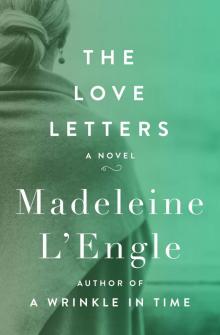 Love Letters
Love Letters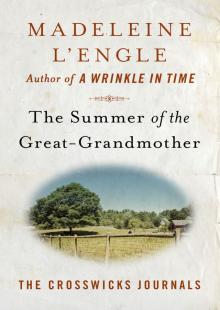 The Summer of the Great-Grandmother
The Summer of the Great-Grandmother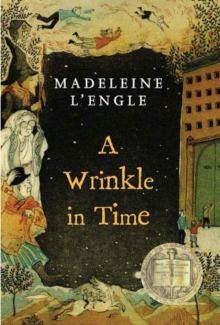 A Wrinkle in Time
A Wrinkle in Time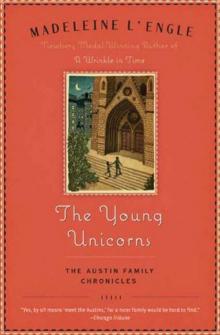 The Young Unicorns
The Young Unicorns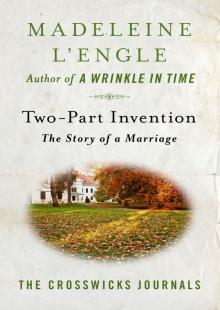 Two-Part Invention: The Story of a Marriage
Two-Part Invention: The Story of a Marriage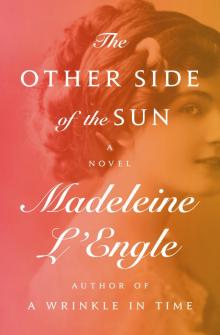 The Other Side of the Sun
The Other Side of the Sun A House Like a Lotus
A House Like a Lotus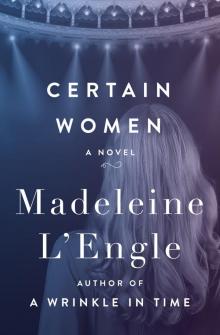 Certain Women
Certain Women Many Waters
Many Waters Camilla
Camilla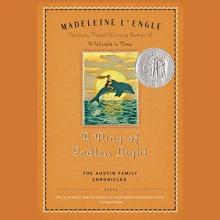 A Ring of Endless Light
A Ring of Endless Light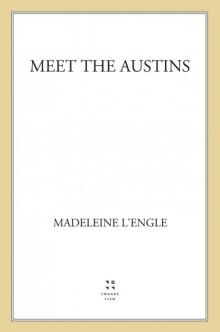 Meet the Austins
Meet the Austins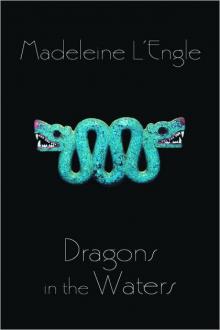 Dragons in the Waters
Dragons in the Waters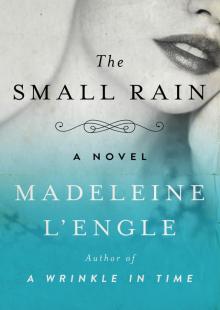 The Small Rain
The Small Rain The Moment of Tenderness
The Moment of Tenderness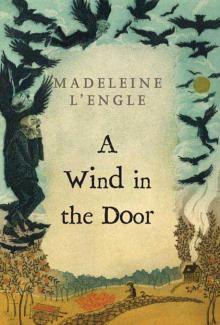 A Wind in the Door
A Wind in the Door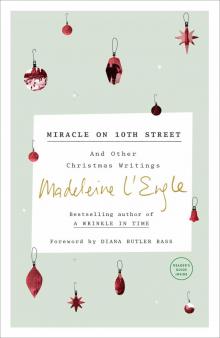 Miracle on 10th Street
Miracle on 10th Street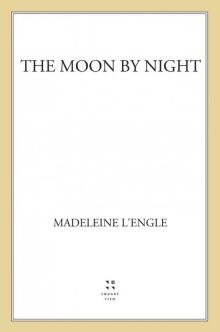 The Moon by Night
The Moon by Night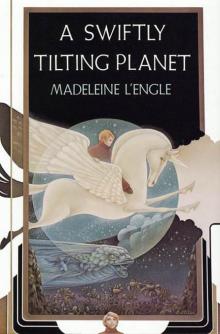 A Swiftly Tilting Planet
A Swiftly Tilting Planet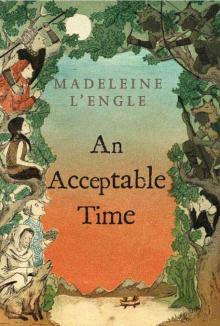 An Acceptable Time
An Acceptable Time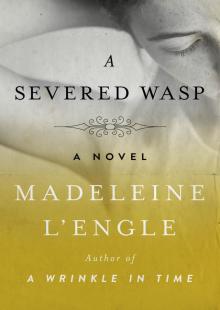 A Severed Wasp
A Severed Wasp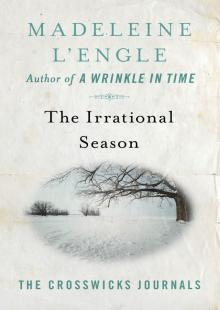 The Irrational Season
The Irrational Season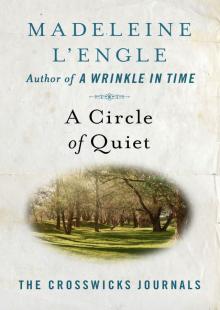 A Circle of Quiet
A Circle of Quiet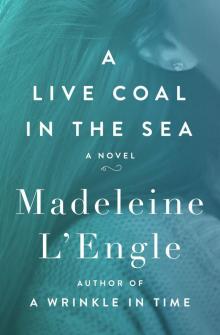 A Live Coal in the Sea
A Live Coal in the Sea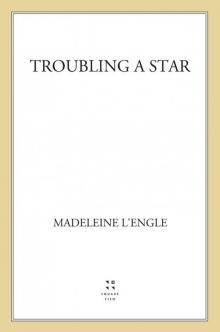 Troubling a Star
Troubling a Star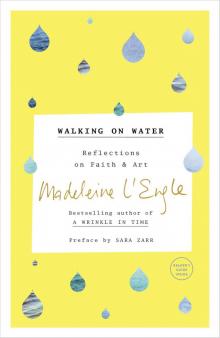 Walking on Water: Reflections on Faith and Art
Walking on Water: Reflections on Faith and Art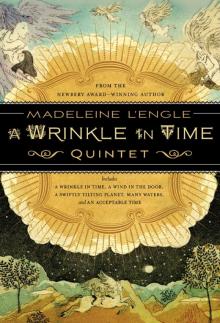 A Wrinkle in Time Quintet
A Wrinkle in Time Quintet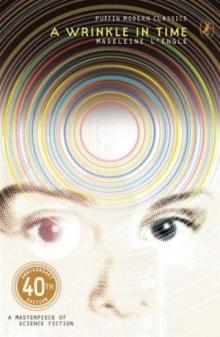 Wrinkle in Time
Wrinkle in Time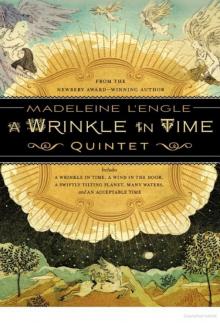 The Wrinkle in Time Quintet
The Wrinkle in Time Quintet Intergalactic P.S. 3
Intergalactic P.S. 3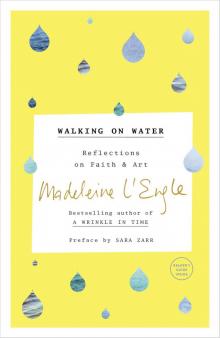 Walking on Water
Walking on Water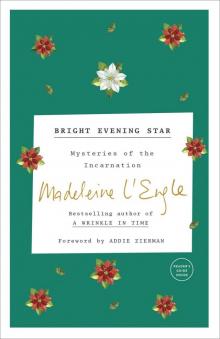 Bright Evening Star
Bright Evening Star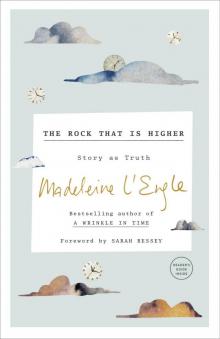 The Rock That Is Higher
The Rock That Is Higher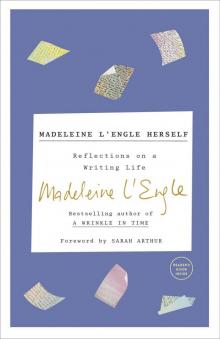 Madeleine L'Engle Herself
Madeleine L'Engle Herself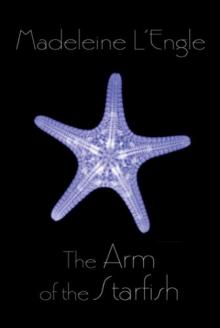 The Arm of the Starfish
The Arm of the Starfish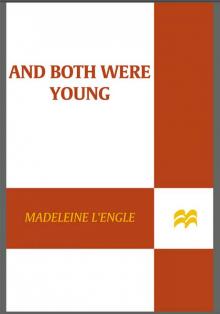 And Both Were Young
And Both Were Young The Twenty-four Days Before Christmas
The Twenty-four Days Before Christmas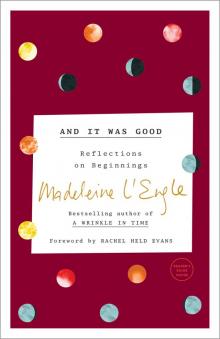 And It Was Good
And It Was Good A Stone for a Pillow
A Stone for a Pillow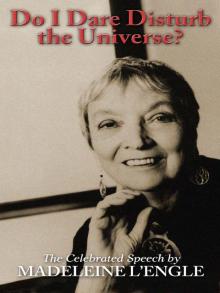 Do I Dare Disturb the Universe?
Do I Dare Disturb the Universe?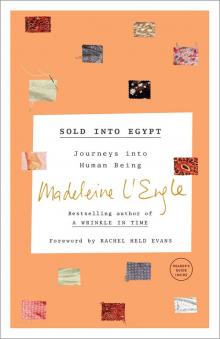 Sold into Egypt
Sold into Egypt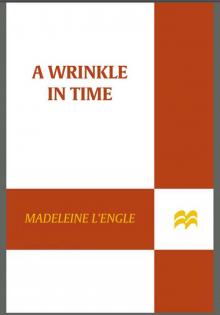 A Wrinkle in Time (Madeleine L'Engle's Time Quintet)
A Wrinkle in Time (Madeleine L'Engle's Time Quintet)